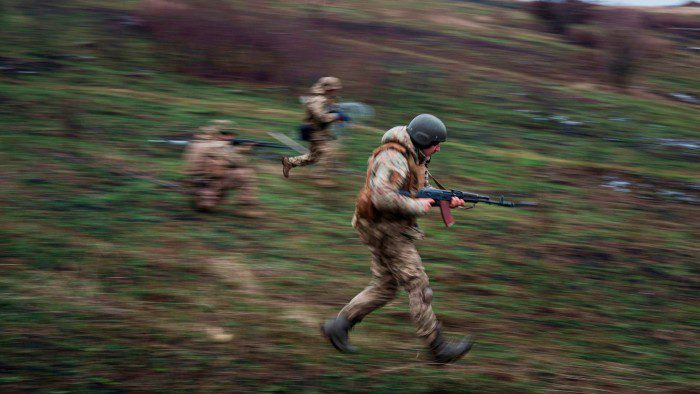
Western capitals are gearing up for a potentially crucial week impacting European security, as discussions between the US and Russia commence in hopes of concluding the conflict in Ukraine. Simultaneously, European leaders are convening for an urgent meeting to address the rapidly evolving negotiations occurring without their involvement.
This gathering will take place in Paris on Monday, bringing together influential European figures to discuss Ukraine’s situation and the future of defense in Europe—an initiative prompted by Donald Trump’s recent move to initiate peace talks with Russia. These discussions will formally kick off in Saudi Arabia this week, where Trump’s chief diplomat, Marco Rubio, will hold talks with Russia’s Sergei Lavrov.
The objective of the Rubio-Lavrov meeting is to prepare the stage for a potential encounter between Trump and Vladimir Putin, following Trump’s surprising agreement with his Russian counterpart to start peace negotiations less than a week ago. This scenario emphasizes the Europeans’ exclusion from conversations that may significantly alter the continent’s security framework.
“This marks the dawn of a new era. Changes are undeniably underway,” commented Alexander Stubb, Finland’s president, in an interview with the Financial Times. “Are we witnessing a shift in Europe’s foundational structures?”

Referencing the date of Russia’s comprehensive invasion, Stubb remarked, “I believe the global order began to transform on February 24, 2022, and we are now observing its potential direction.”
Key figures such as UK Prime Minister Sir Keir Starmer, German Chancellor Olaf Scholz, Polish Prime Minister Donald Tusk, along with leaders of EU institutions and NATO, will gather in Paris at President Emmanuel Macron’s request. Joined by the heads of government from Italy, Spain, the Netherlands, and Denmark, their agenda will focus on concrete strategies to bolster European defense amidst the uncertainties of future US involvement, alongside measures to support Ukraine effectively and enhance their bargaining power.
Starmer labeled this moment as “a rare opportunity for our national security to confront the real issues our world faces today.”
A Western official, familiar with the discussions, expressed, “The pace of developments is astonishing. Europe’s primary goal should be to provide Ukraine with as much aid as possible, empowering it to resist pressure from the US and Russia.”

Dmitry Peskov, spokesperson for Putin, remarked that Trump’s proposal to initiate discussions represents a “strong indication that we are aiming to resolve issues through dialogue and focus on peace rather than conflict,” during comments aired on state television on Sunday.
Ukraine was not included in the US-Russia discussions scheduled in Saudi Arabia, learning about them through media outlets, according to a source close to President Volodymyr Zelenskyy. Nevertheless, Ukraine’s diplomats intend to attend independently after visiting the United Arab Emirates and Turkey.
“While we acknowledge that the Americans have their own concerns with Russia, it is essential to include Ukraine and Europe in conversations that pertain to Ukraine and Europe,” the source stated.
During the Paris summit, European leaders will primarily discuss the potential deployment of European forces to Ukraine, which would be stationed behind an eventual ceasefire line as a form of “reassurance force,” according to three officials. Alternatives may arise prior to the meeting, with Germany notably showing caution regarding the concept of peacekeeping troops.
There is uncertainty surrounding the US’s possible role in ensuring the security of any NATO forces in Ukraine. Trump’s team has ruled out sending US troops but European officials suggest that the US has not eliminated the option of providing support to NATO allies’ deployments.
Numerous European nations are also somewhat apprehensive about fulfilling a US request for specific information on military resources, financial aid, and peacekeeping personnel they would be willing to dispatch to post-conflict Ukraine, according to various officials.
“The prevailing sentiment is that this serves as a valuable exercise to determine what each nation can contribute, but the response to the US should reflect a collective stance,” noted one official.
Stubb expressed hope that the outcomes of the Paris discussions would resonate positively with Americans, leading to increased commitment.
In the lead-up to the meeting, European leaders and diplomats engaged in extensive discussions at the Munich Security Conference, analyzing the roles of various members of Trump’s negotiating team and their potential influence on the president’s strategy.
One senior European official indicated a “95 percent consensus” with Keith Kellogg, the 80-year-old retired general appointed as Trump’s envoy to Ukraine, who has publicly labeled Russia as “the enemy.”
However, the official cautioned that Kellogg’s views, who was not listed among Trump’s core negotiating team, may not align with those of Rubio, who could potentially have different perspectives on the matter. During a G7 foreign ministers meeting in Munich, Rubio appeared less inclined to express his stance on Ukraine, according to three individuals informed about the exchanges. Two of those individuals reported that Rubio indicated the discussions with Lavrov would center on logistical and planning issues related to a Trump-Putin meeting.
Rubio mentioned to CBS on Sunday that Trump’s conversation with Putin had been positive, yet emphasized that “the upcoming weeks and days will reveal whether this is a serious endeavor. Much work lies ahead.”
Peskov stated on Sunday that “under the previous administration, there was no dialogue, just unending war.” He highlighted that Trump’s approach “should garner respect from any reasonable individual or nation,” yet asserted that Russia would “defend its interests and remain cautious of any misguided assurances.”
Additional reporting by Felicia Schwartz in Munich, Leila Abboud in Paris, Lucy Fisher in London, and Christopher Miller in Kyiv









